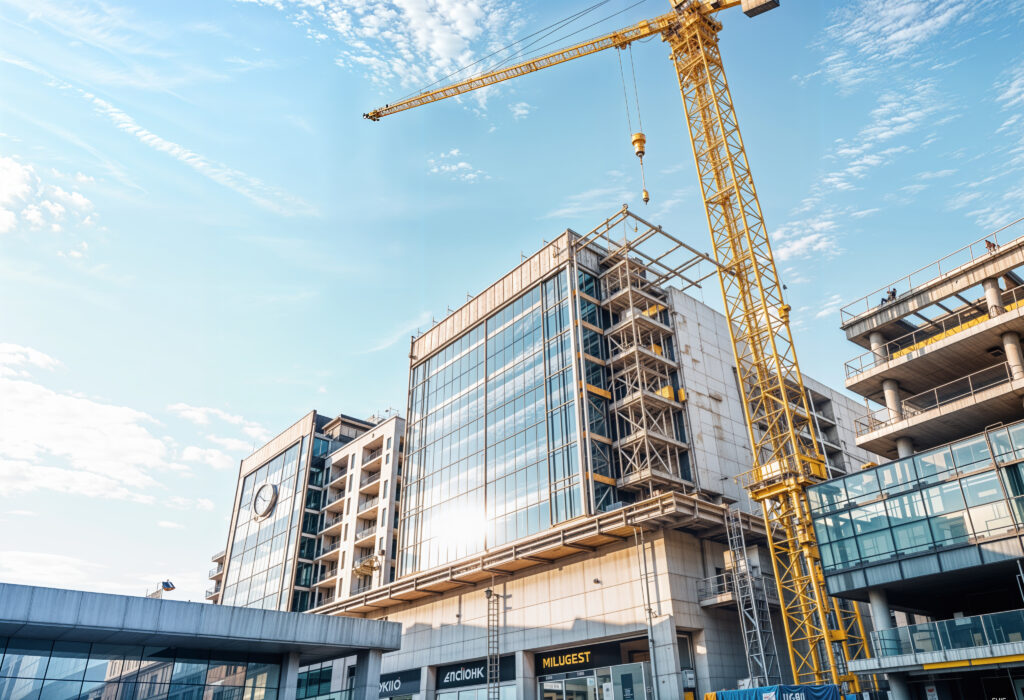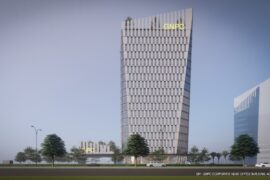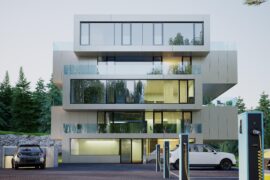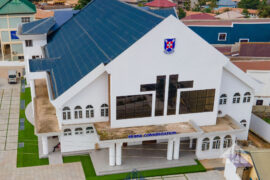Key Takeaways
- Sustainable building practices prioritize eco-friendly materials and energy-efficient solutions, reflecting Ghana’s commitment to environmental responsibility.
- Technology integration enhances energy efficiency through smart home systems and digital design tools for better architectural planning.
- Local materials and craftsmanship preserve cultural heritage, using traditional resources like laterite and clay to create unique, community-reflective structures.
- Modern architecture incorporates traditional motifs and storytelling elements, blending contemporary designs with Ghana’s rich cultural history.
- Flexible and functional spaces are increasingly popular, allowing for multi-purpose layouts that adapt to diverse living and working needs.
Embracing Sustainable Building Practices
As the world increasingly prioritizes environmental responsibility, you might find that Ghana is embracing sustainable building practices more than ever. The shift towards eco-friendly construction methods reflects a growing awareness of the environmental impact of traditional building techniques. Using locally sourced materials not only supports the economy but also reduces transportation emissions, making it a smart choice for reducing carbon footprints. Incorporating green energy solutions like solar panels and rainwater harvesting systems is becoming standard in new buildings. These advancements not only lower energy costs but also promote self-sufficiency for homeowners. You’ll see architects designing spaces that optimize natural light and ventilation, creating healthier indoor environments.Building Construction Process Explained From Start to Finish
Join us as we journey through the building construction process, uncovering each vital step and its significance; discover what comes next!
Integrating Technology in Design
The push for sustainable building practices in Ghana naturally complements the integration of technology in design. As you explore modern architecture, you’ll notice how digital tools are redefining spaces. Smart home technology, for example, offers innovative solutions for energy efficiency and convenience. By incorporating these technologies, you’re not just enhancing functionality; you’re also creating a more sustainable future.
| Technology | Application |
|——————-|——————————-|
| Smart Home Systems | Automate energy consumption |
| Digital Design Tools | Streamline architectural planning |
| Energy Monitoring Apps | Track and optimize usage |
Utilizing smart home features, like automated lighting and climate control, you can considerably reduce energy waste. Digital tools also empower architects and builders to visualize projects in real-time, improving collaboration. This seamless integration of technology fosters a forward-thinking approach in Ghana’s architectural landscape.
Utilizing Local Materials and Craftsmanship
Utilizing local materials and craftsmanship in building design not only honors Ghana’s rich cultural heritage but also enhances sustainability. When you choose traditional materials like laterite, clay, and bamboo, you tap into resources that are abundant and environmentally friendly. This approach reduces transportation costs and carbon footprints while supporting local economies. Incorporating local craftsmanship into your designs means you’re not just building structures; you’re creating spaces that reflect the community’s identity. Skilled artisans bring unique techniques and styles, transforming ordinary buildings into works of art. By valuing these practices, you foster a sense of pride among local craftsmen and encourage the preservation of skills that might otherwise fade away. Ultimately, embracing local materials and craftsmanship leads to more meaningful architecture. You’re not just constructing a building; you’re weaving a narrative that connects people to their heritage and environment, ensuring that your designs resonate deeply within the community.Reflecting Cultural Heritage in Modern Architecture
While modern architecture often seeks to innovate, it can simultaneously pay homage to the rich tapestry of cultural heritage that defines Ghana. You’ll notice how contemporary designs incorporate elements of traditional motifs, reflecting cultural symbolism that resonates deeply within communities. For instance, architects are weaving stories into their structures, using shapes and materials that echo ancestral narratives. This architectural storytelling serves not just an aesthetic purpose but also fosters a sense of identity and belonging. Buildings adorned with colorful patterns often draw from local folklore, transforming urban spaces into living galleries of Ghanaian history. As you walk through these neighborhoods, you can feel the blend of past and present, where modernity meets heritage.Building Collapsed at Ofankor – What Really Happened?
On October 12, 2023, a building collapsed at Ofankor, shocking the local community. Preliminary investigations revealed structural integrity issues, poor construction practices, and non-compliance with engineering standards as potential causes. Eyewitness accounts described chaos during the incident, with urgent
Prioritizing Functional and Flexible Spaces
In today’s dynamic living environments, prioritizing functional and flexible spaces has become essential for architects in Ghana. You’ll find that the trend towards multi-purpose layouts is reshaping how spaces are utilized. These adaptable environments allow residents to transform areas based on their needs, whether for work, relaxation, or social gatherings.
| Space Type | Purpose | Flexibility Level |
|——————–|————————–|———————|
| Living Rooms | Socializing & Relaxation | High |
| Home Offices | Work & Study | Medium |
| Multi-purpose Rooms | Events & Activities | Very High |
Frequently Asked Questions
What Are the Costs Associated With Sustainable Building Materials in Ghana?
When considering costs for sustainable building materials in Ghana, you’ll find that sustainable sourcing often increases expenses due to limited material availability. However, long-term savings through energy efficiency can offset these initial investments considerably.How Do Local Climate Conditions Influence Architectural Design Choices?
Local climate conditions greatly influence your building design choices. You’ll prioritize climate responsive design, ensuring thermal comfort through materials and orientation, optimizing natural ventilation and shading to create energy-efficient, sustainable spaces that adapt to environmental demands.What Role Do Government Regulations Play in Building Design Trends?
Government regulations shape your architectural choices by establishing regulatory frameworks and design standards. These rules guarantee safety, sustainability, and aesthetic consistency, guiding you to make informed decisions that meet both community needs and legal requirements.How Can Architects Ensure Designs Meet Community Needs?
To guarantee designs meet community needs, you should prioritize community engagement and actively seek user feedback. By incorporating insights from those who will inhabit the spaces, you create more functional, relevant, and harmonious architectural solutions.What Are the Challenges in Preserving Cultural Heritage in Modern Architecture?
You’ll face challenges in preserving cultural identity while ensuring architectural authenticity. Balancing modern needs with historical context can be tough, as contemporary designs often overshadow traditional elements, risking the very essence of cultural heritage in architecture.Conclusion
To summarize, the architectural landscape in Ghana is evolving through sustainable practices, innovative technology, and a deep respect for cultural heritage. By prioritizing local materials and craftsmanship, you’re not only enhancing the aesthetic appeal but also fostering community connections. As you design functional and flexible spaces, you’re paving the way for a future that honors tradition while embracing modernity. This dynamic blend of influences is shaping a unique architectural identity that resonates with both the past and the present.Discover more from Ghana Scoop
Subscribe to get the latest posts sent to your email.





